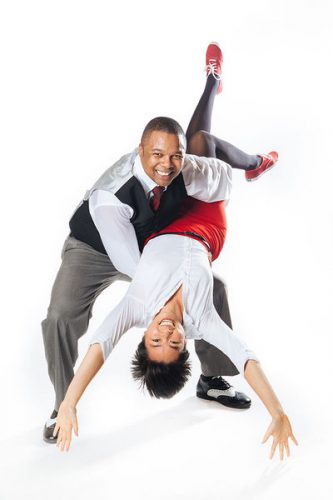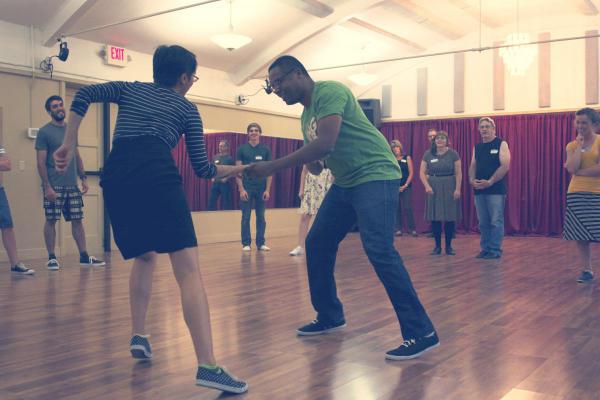
No wonder local swing dancer Nick Davis has fallen hard for Lindy hop. It’s sexy, funny and fresh. It’s the most goddamn exhilarating movement I’ve seen.
Watching a video of dancer Frankie Manning swing his partner with such centripetal force — linked solely by fingertips, momentum building like a merry-go-round — it’s easy to imagine that, were they to let go, each dancer would ricochet into outer space.
Manning expertly bops around the floor like it’s hot lava, he and his partner flipping through the air like tightly coiled springs. Their smiles are wide and giddy, while the choreography seems to poke fun at gravity and gender roles. Jittering with unbridled athleticism and showmanship, the moves are edgy and innovative. It’s 1941.
Davis had advised me to watch this legendary scene from Hellzapoppin, choreographed by Manning. Many, he says, have been lured to swing after watching Manning, a founder and master of the dance. Davis has even had the opportunity to study under Manning briefly before he died in 2009 at the age of 94.
“To the old-timers, it was like a street dance,” Davis says, comparing its origins to that of hip hop. “Really, swing dancing was innovated by young black people.”
Inspired by Manning’s legacy, Davis, 35, founded Eugene’s Track Town Swing Club, a group of about 30 dancers that are “dedicated to resurrecting Lindy hop swing in Eugene.” They practice, teach lessons and host monthly social dances at the Vet’s Club, sometimes traveling up and down the coast for competitions and events.
This Saturday, Sept. 12, will be Track Town’s first swing dance of the season, and on Oct. 10, the swing club celebrates its third anniversary hosting a dance with live swing music from local big band Blue Skies.
“It’s been an interesting journey,” Davis says, who also works fulltime as a graphic designer. “It’s connected me to my culture as an African-American person.”
Lindy hop sparked in 1920s Harlem from a fusion of jazz, tap, breakaway and the Charleston. It’s considered the granddaddy of swing and the raw heartbeat of jazz. Arthur Murray and other white dance professionals eventually transformed the social dance into something less wild for waspier crowds — East Coast and West Coast swing.
By the late ’50s, however, the dance’s popularity had waned, and several of the original hoppers faded away — Manning joined the U.S. Postal Service in 1955, working there for 32 years.
Then something amazing happened: In the ’80s, a handful of American and European dancers rediscovered the dance via old video footage, including Hellzapoppin, and fell in love. They tracked down the “old-timers” and pulled them out of retirement, including Manning, then in his 70s.
In 1987, Manning was invited to Sweden by dancer Lennart Westerlund, founder of the Herräng Dance Camp, a mecca for Lindy hoppers worldwide. Manning would return to teach at the camp almost every year for rest of his life.
Nearly three decades later, in the summer of 2014, the Frankie Manning Foundation recognized Davis’ efforts to revive the dance in Eugene and awarded him a scholarship, sending him to Herräng to study how to dance, teach and spread the gospel of Lindy hop. He returned again this summer.
“I learned a ton,” Davis says. “It gave me the confidence I needed to keep the [Track Town] dance series going.”
“Nick is legit,” says Track Towner Nika Jin.
Fellow Track Town dancer Kat Anthony says Davis’ passion is one of the main reasons she kept with Lindy hop. “I like that Nick puts emphasis on the history and legacy of the dance.”

Davis started Track Town in 2012. He first picked up dancing when he was 18 after he saw the 2001 performance of Dance for a Reason and took an “MTV Dancing” class at Lane Community College.
“It basically changed my life,” he says of dance, adding that before then he had been a “nerdy kid” who “wasn’t physical.”
While Davis tried swing at LCC in the early oughts, he turned his focus to hip-hop dance, performing with Zapp Academy of Dance for eight years and, more recently, a stint with King’s Krew, a local company that mixes hip hop, breakdancing, modern and street jazz movement.
After a back injury, however, his body could no longer endure that style of dance. “Maybe it’s time to settle down a little bit,” he recalls thinking, “and get back into social dancing.”
And so he returned to Lindy hop, stringing together afterhours studio time at Zapp and dropping in on the Sunday lessons and dances taught by longtime Oregon Lindy hop instructor Denise Steele at the UO’s Agate Hall. In the mid-oughts, Steele brought Frankie Manning to Oregon for Lindy hop workshops, where Davis took classes with the icon.
“[Steele] really got me connected to the history of Lindy hop,” he says. “Frankie is like a living connection to my past heritage. Having the opportunity to be in the same room as him was tremendous.” He adds: “It’s had a huge impact in my life to keep going with what I’m doing.”
When Agate Hall went under construction and the lessons ceased, Davis says the local swing community took a hit. “There were not people putting on these styles of dances anymore.”
Dancers from the Corvallis Swing Dance Society — who have built a serious swing scene up Hwy. 99 — dropped in on Davis’ makeshift dances a couple times at Zapp Academy. “You can make this happen,” Davis recalls them telling him.
In November 2012, Track Town Swing Club rented out studio space in South Eugene and hosted its first social Lindy hop dance. Eighty people showed up. “We weren’t prepared for that kind of response,” he says. Due to the growing interest, Track Town found a bigger, more permanent home at the Vet’s Club, where they rent studio space from Salseros Dance Company. Davis has now been teaching lessons there for a year.
“Students really inspire me to keep going,” he says. His passion has rubbed off.
Lindy hop “really opened my mind,” Kat Anthony says. “I fell in love with it instantly.” When pressed why, Anthony offers, “The dance itself is goofy by nature — there’s no need for perfection” and “the community is amazing.”
Nika Jin says that after she and her partner Mateo Palfreman took lessons from Davis, they started UO Swing Night, a free lesson and open dance Monday nights in the UO Global Scholars Hall. This summer, several Track Towners traveled with Davis to Sweden for the Herräng camp.
At the end of the summer’s last lesson in August, student after student, from teens to septuagenarians, approach Davis to thank him.
“Bless my heart,” Davis whispers as one student walks away. “When people are really into it, it’s really nice. It’s really cool.”
Track Town Swing Club host two four-week swing series each month. The 8-Count Lindy hop class runs 7 to 8 pm followed by the Beginning Swing Dance series (including 6-Count Lindy hop and East Coast swing) 8 to 9 pm Tuesdays; $35 adv., $40 door. Classes progress from week to week. The first swing dance of the season starts with a beginner lesson 7 to 8 pm, followed by and open dance 8 to 10:30 pm, Saturday, Sept. 12, at the Vet’s Club; $7. Track Town hosts its 3rd-anniversary dance Oct. 10. For more info, visit tracktownswing.com. For more details about UO Swing Night, find the group’s page on Facebook or email uoswingnight@gmail.com